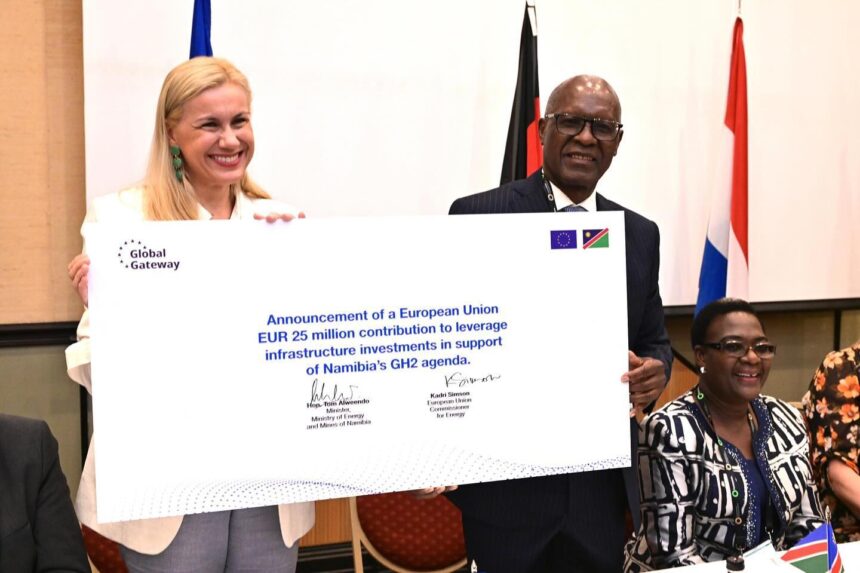New Era business reporter Maihapa Ndjavera (MN) sat with Kadri Simson (KS), European Commissioner for Energy, during the inaugural Global African Hydrogen Summit last week to discuss issues such as the EU’s interest in Namibia’s green hydrogen ambitions.
MN: How are you finding the summit?
KS: So far, I am positively impressed, and the most impressive thing is the attendance at this Global African Hydrogen Summit in Namibia. This was well organised. I had fruitful meetings with many stakeholders.
MN: What motivates the EU’s significant interest in supporting Namibia’s green development?
KS: The European Union is creating new partnerships across the globe. Our aim is to diversify our energy partnerships in such a way that we will have a list of trusted partners who could be our trading partners in the future when green hydrogen becomes the globally trading commodity. This was a decision made by Namibia to become regional or even a global green hydrogen hub, so our task is to support Namibia in this path. From our side, what we can do is to offer visibility about market developments because it is highly likely that the first demand centre will be the EU, so we encourage promoters who need certainty before concluding their final investment decision. What we saw in Namibia is that the government has been very supportive when it comes to the green hydrogen development, as this is a legacy of the late President Hage Geingob, which is highly respected and valued.
MN: The EU has provided Namibia with a €40 million grant to maximise the country’s green hydrogen potential. Are you satisfied with how this money has been used?
KS: Before green hydrogen production can even start, government has to set up clear frameworks, and part of our financing is also to support this development. I am confident that the government is doing everything in its power to make all dreams realised in terms of green transition.
MN: You mentioned some standards that the EU is placing on the term green hydrogen. Please explain this.
KS: In efforts to clear the emissions, we have created a certification scheme. For Namibia, our certification is very favourable, and all project promoters already know that they will easily meet this requirement.
MN: How will the EU ensure that Namibia’s distance from Europe doesn’t disadvantage its green energy initiatives over green hydrogen producers (like Morocco) closer to the EU market?
KS: It is very true that green hydrogen in its pure form and in large quantities is transportable by a pipeline, so our next-door neighbours do have some advantage. There are also derivatives, like green ammonia, which will be key for the shipping industry. There are other derivates from green hydrogen that are already shipped around the globe, so the distance does not matter.
MN: How can Namibia leverage its trade agreements to diversify its economy, create more value-added exports and transition to renewable energy?
KS: There are very important agreements penned by our leaders. Most are focused on diversifying trade balance. There will be different commodities to buy from Namibia – and on top of that, the call of our agreements has already been that we help with value creation, and more wealth will be created here in Namibia. We do understand that demand for energy in Namibia will grow, and first you need to replace imported fossil electricity with the locally renewable resources, and there are local projects to help Namibia achieve that.
MN: There is a belief that European countries are attempting to recolonise Africa through energy transition agreements. How would you allay these fears?
KS: This is a very exclusive list of countries with whom the EU have signed strategic partnerships, like Norway, which is the major natural gas and oil producer – but at the same time, also very interested in green transition and very ambitious. We have similar partnerships with Canada, Chile and Kazakhstan. Namibia is really in a good company, and we are offering support for Namibia to become a regional hub. We are not taking anything from Namibia. We are just partners in a win-win situation.
MN: The EU has commenced its energy transition to carbon neutral energy sources. However, Namibia and other developing nations have only just discovered fossil fuels. Will the EU support a just energy transition for the global south?
KS: We have targeted relationships to help countries where thousands of people are dependent on coal mining because that is the first thing that pollutes and create most greenhouse gas emissions. In Europe, we have seen many mining workers who needed assurance that they will find new jobs, and renewable projects do create many jobs, so it is necessary to re-skill people to find new jobs opportunities. On the new oil and gas discoveries, the international world is saying global investors redirected their investments from new fossil exploration sites to renewable, so a decade ago, many investments were in oil and gas, and now is vice versa. So, this transition is happening because private investors made up their mind about the future.
MN: EU countries have a dark history on the continent with their colonial history, and former colonies such as Namibia have been asking for reparations. When will these countries find relief from your members?
KS: There are different European countries with different history – and all together, as Team Europe, we are committed to creating future-looking new partnerships, so I respect the bilateral issues between countries, but my aim is to create mutual beneficial agreements.
MN: Any concluding remarks?
KS: Green energy transition needs network of partnership, and the EU sees that very clearly. This is why we are deepening collaborations. The biggest reward we are going to give the green hydrogen producers is the level playing field that we will create for green goods.



